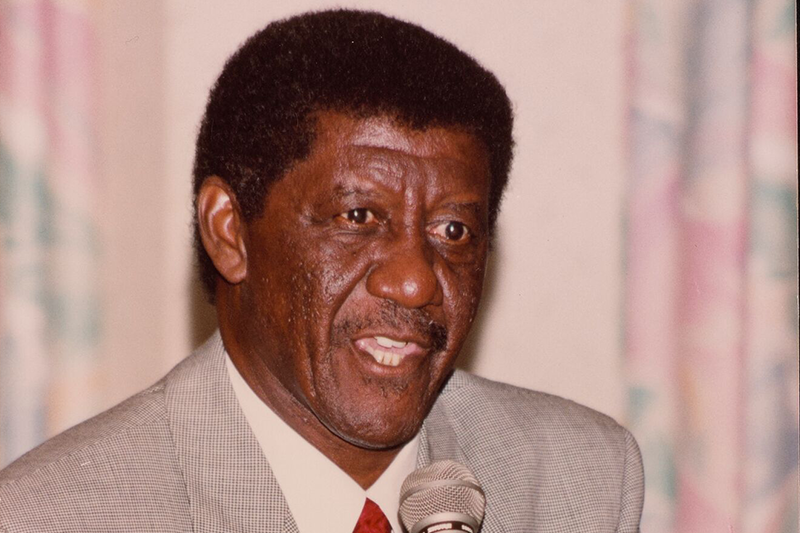Freddie Dyles
BY RAVEN JOY SHONEL, Staff Writer
GULFPORT — “We come tonight requesting the approval of naming the Jonathan C. Gibbs High School Gymnasium the Freddie Dyles Gymnasium,” said Patricia Wright, area 4 superintendent of Pinellas County Schools at the school board meeting last Tuesday.
With a unanimous vote, the Pinellas County School Board rechristened the Gibbs High School gymnasium after its most beloved, not to mention, the winningest coach in its nine-decade history, Coach Freddie Dyles.
It was not until 2010 when one of Coach Dyles’ former players (Dan Wright) surpassed his record of being the winningest boys basketball coach in Pinellas County. He began his Gibbs coaching career in 1964 during staunch segregation. He led the Gladiators to a black-school state title in 1966.
Under his watch, Gibbs became the first all-black high school to leave the Florida Interscholastic Athletic Association in 1967 to join the Florida High School Activities Association. Coach Dyles led Gibbs to FHSAA state crowns in ’67 (Class 2A) and ’69 (1A).
Coach Dyles and his team drew spectators into the thousands. In 1967, during the regional final against Tampa Hillsborough, 5,000 excited fans packed the University of Tampa’s George B. Howell Gym. As large of a crowd that was, the numbers are said to have doubled during the final game of a holiday tournament played at the Bayfront Center in downtown St. Pete.
At the time, it was said to have been the largest crowd ever to attend a high school game in Florida, and the Gladiators proved the victors, winning 70-66.
Coach Dyles garnered widespread respect from his coaching peers and the community.
“They called him “the Dean,” said Ray Tampa, who helped spearhead this round of support to have the gym renamed in Dyles’ honor. “He took teenage high school boys and instilled discipline, respect, determination and teamwork principals in all his players.”
Current Gibbs principal Rueben Hepburn has been well versed on Coach Dyles lore. He said he learned that Dyles not only coached boys basketball, but he also trained the girls’ team.
“He built young people up, taught them how to be leaders, but also he taught them what it means to respect their history and the future of their city,” said Hepburn.
School Board member Bill Dudley said he had a chance to work with Dyles in the beginning of his career at Northeast High School. Unfortunately for Dudley, the Gladiators would trounce the Vikings, but he enjoyed working with “the Dean” during the summertime.
“I can’t believe it’s taken this long to have a gym named after him. I thought it would have been done a long time ago,” said Dudley, who coached basketball, football, cross country and wrestling throughout his career.
Back in 1996, Minson Rubin, president of Gibbs Gladiator Alumni Association, Inc. said he tried to get the school board to rename the gym in Dyles’ honor, but they refused. “They had all kinds of lame excuses,” he said.
When Coach Dyles was still alive when Barbara Shorter was the principal, Rubin would have activities at Gibbs to honor him, so he was very pleased with the April 23 outcome.
“Today was a monumental thing that took place,” said Rubin.
School Board Chair Rene Flowers brought the renaming of the gym to the board, and this go-round there was no push back.
“That legacy continues because even today the demand for discipline, hard work and student achievement are the same parameters by which those basketball and football players are placed right now,” Flowers said. “Mr. Dyles still walks the halls.”
Held at Gulfport City Hall, the April school board meeting was pack with Gladiators honoring Coach Dyles. One such person was Thomas “Jet” Jackson. Dyles coached him at Sixteenth Street Junior High, now known as John Hopkins Middle School.
“He looked out for his ballplayers. They were the best-dressed kids. I think he brought that into the association because they would just come any kind of way, but his team was always dressed nice and well-mannered.”
Years later, Jackson worked with Coach Dyles in the Parks and Recreation Department for the City of St. Petersburg. Back then, coaches were hired during the summer months at recreation centers.
“He was an incredible person. I can’t say enough about him,” said Jackson, who has worked for the city for more than five decades.
Rev. Michael Hawkins formed a lasting bond with Coach Dyles after he left the St. Petersburg Police Department and took a job as a school resource officer at Gibbs. He ended up traveling with the team around the state of Florida.
“There were some instances where we went to gyms that were hostile back in the late 80s and early 90s,” said Officer Hawkins. “He took it all with a grain of salt. He said, ‘All that crowd has nothing to do with you all playing on the court.’”
He revealed that Coach Dyles would get upset with some of the referees because he felt that his team had more of a challenge coming from the officials than their opponents.
Hawkins and Coach Dyles worked in tandem. If one of his charges were getting into trouble, Officer Hawkins would tell the coach, and that bad behavior would soon stop. The young men would beg him not to tell Dyles because they knew that meant some sort of discipline coupled with extra practice.
Coach Dyles was known to go above and behind for his students. He even sold donuts to raise money for equipment and uniforms.
The scores of Gladiators in attendance from years gone by spoke volumes of the legacy and unending respect the community has for Coach Dyles, who as a Gladiator played on the 1952 basketball championship team under Coach Joe Johnson.
Dyles passed away at the age of 66 in 1999. A formal ceremony to dedicate the gym in his name is planned for later on in the year.






